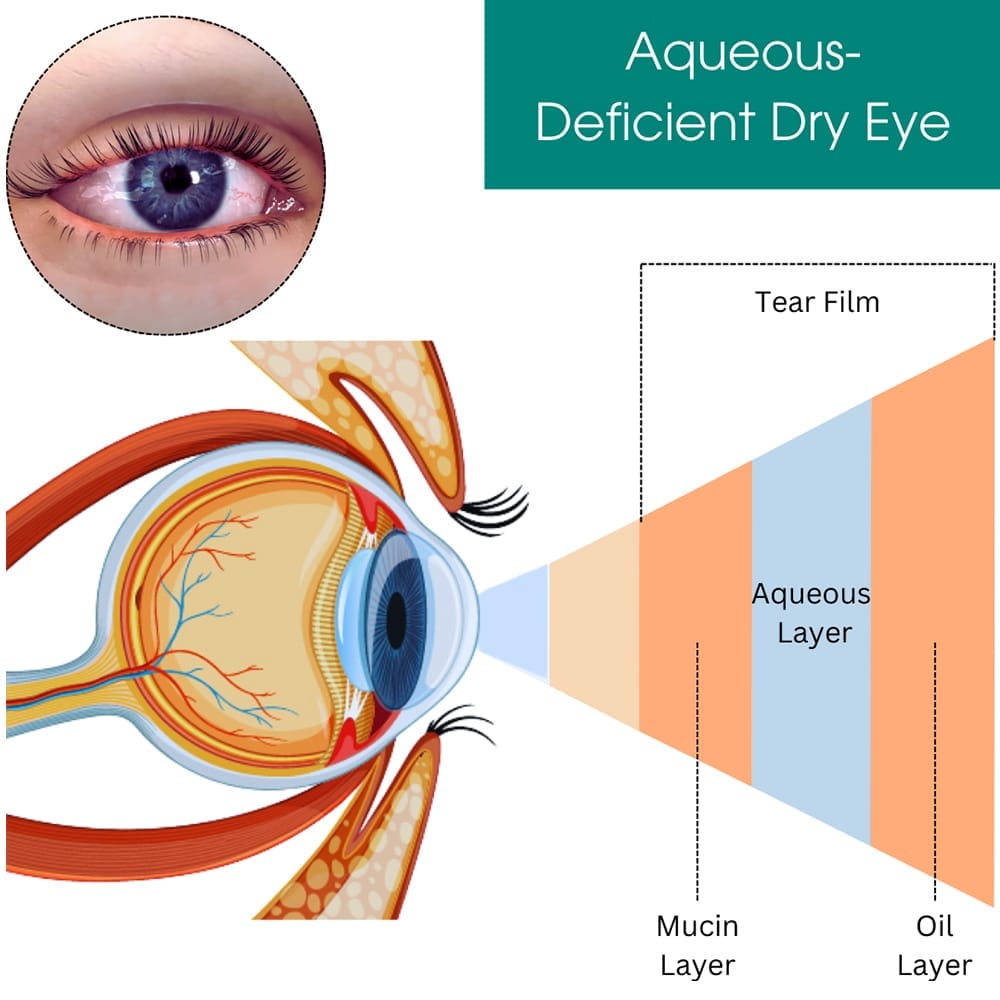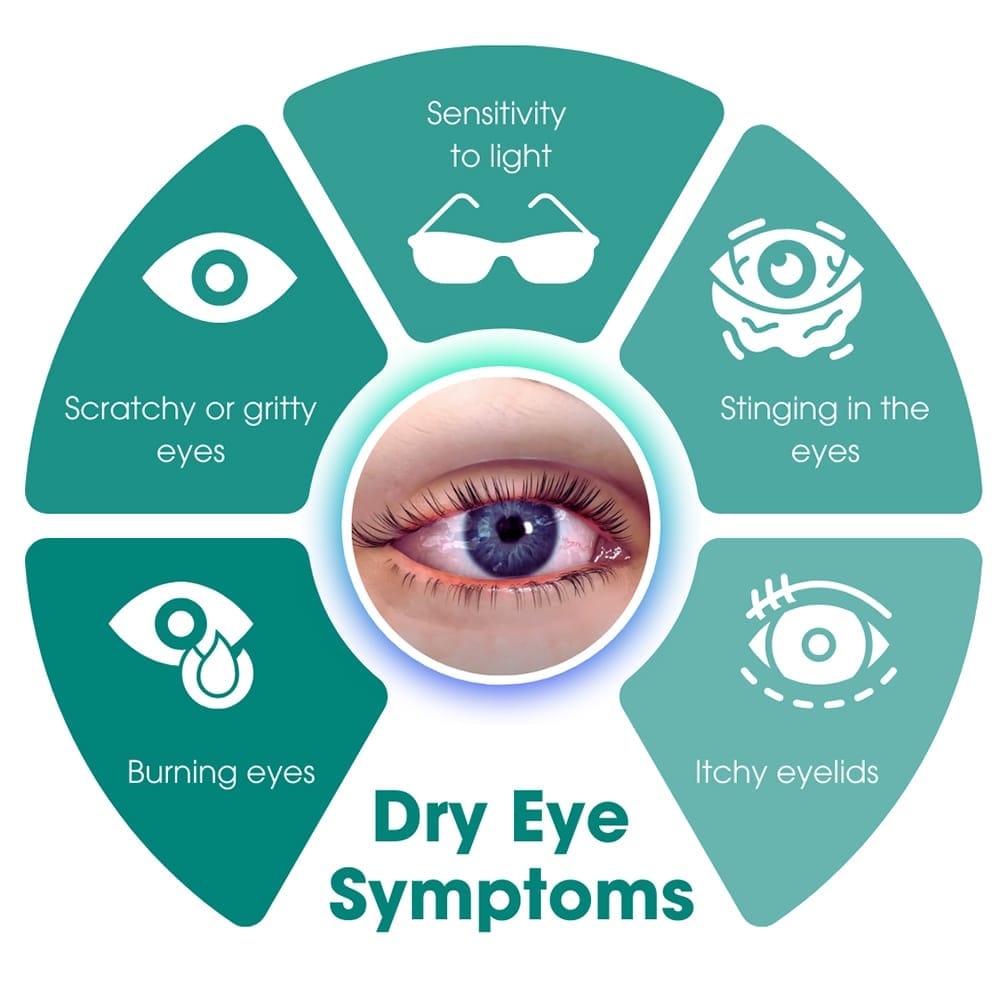Aqueous-deficient dry eye develops when your eyes don’t produce enough fluids to lubricate the eye sufficiently. More specifically, this condition occurs when the lacrimal glands fail to create the amount of oils necessary. You might have 20/20 vision but feel like you just don’t see well. While dry eye doesn’t cause blindness, advanced cases do impact your quality of life. Constantly rubbing or blinking your eyes to counter the condition is tiresome, to say the least.
Dry-eye disease (DED) affects about twenty percent of Americans. The condition can’t be cured, but it can be managed once your eye doctor determines the cause. Seeking aqueous-deficient dry eye treatment in the early stages improves the chances of reducing its impact on your eyes. Home care, eye drops and medical procedures are typical treatments for aqueous-deficient dry eye.
If you’re looking for help with aqueous-deficient dry eye treatment in the NYC area, contact the experienced optometrists at Eye Physicians. They have comprehensive eye care Link to Comprehensive Eye Care options to restore your vision and your serenity.

DED is a complex, chronic condition. Aqueous-deficient dry eye is one of the two main subtypes of DED. The other, more common type is evaporative dry eye, Link to Evaporative Dry Eye which occurs when tears are produced but dissipate too quickly.
Every type of dry eye condition is caused by a variety of factors, which is why it’s important to visit a Manhattan eye doctor who can properly diagnose your condition and treat it appropriately.
Sometimes, evaporative dry eye and aqueous-deficient dry eye:
Determining the cause for aqueous-deficient dry eye is tricky. In some cases, the exact culprit just can’t be pinpointed. Your dry eye may be caused by one factor or a combination of factors.
Some of the typical contributors include things like:
Most of the causes listed above can’t be changed. They may be inherited or simply out of your control. But other factors that contribute to aqueous-deficient dry eye can often be controlled, reduced or eliminated.
These include:
In addition, certain medications increase your risk for dry eye disease.
These include drugs that are used to treat such conditions as:
If you have aqueous-deficient dry eye, you might experience one or more symptoms.
Typical signs of the condition include:
Not every person with aqueous-deficient dry eye experiences the same symptoms. Sometimes people with this type of dry eye sense that something is in their eyes that simply won’t go away. Aqueous-deficient dry eye is a complex, chronic condition that may be caused by one factor or a combination of many factors.
Typically, your New York eye doctor focuses on three methods to determine your issue.
No single test exists to diagnose aqueous-deficient dry eye. Instead, your eye physician uses multiple tests to reach a definitive conclusion.
Some of the most common tests may include:

Aqueous-deficient dry eye can’t be cured, but it can be managed with an array of treatments. The process of treatment begins with a careful plan of approach that includes setting goals with you and your doctor to protect your vision and treat your symptoms.
Initial goals include:
One course of action in the treatment of aqueous-deficient dry eye involves stricter control of any environmental cause that can trigger your symptoms. This involves doing things like:
Your NYC eye doctor prescribes treatments based on both underlying conditions and the severity of the symptoms. You often need to try a range of treatments to find the remedy that’s most effective for you.
These might include:
Management of aqueous-deficient dry eye can be challenging. If you’re in New York City and looking for relief, it’s important to contact the professionals at Eye Physicians. With multiple locations throughout NYC, you’re likely to find the Eye physician’s office nearby, providing expert care and striving to make your visit as efficient as possible while ensuring you receive the personalized attention you deserve and the best possible treatment for your dry eye.
Their board-certified doctors are experienced in aqueous-deficient dry eye treatment. They also have experienced and trained pediatric optometrists on staff to provide eye care for your entire family.
Eye Physicians
110 Lafayette St, Suite 503
New York, NY 10013
(212) 292-4814
Entrust the care of your precious eyesight to highly skilled and experienced eye care professionals. For top-notch ophthalmologists and optometrists in Downtown Manhattan, choose Eye Physicians. Eye Physicians ensures prompt care, precise diagnosis, and personalized treatment plans.
Schedule an Appointment